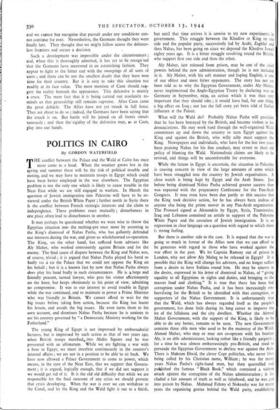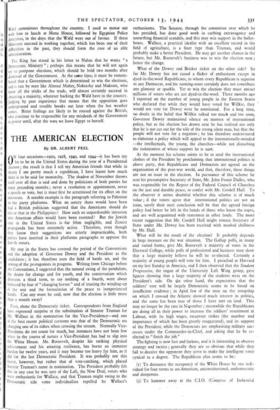POLITICS IN CAIRO
By GORDON WATERF1ELD
THE conflict between the Palace and the Wafd at Cairo has once more come to a head. When the weather grows hot in the spring and summer there will be the risk of political trouble and rioting, and we may have to maintain troops in Egypt which could have been better employed in the war elsewhere. The Egyptian problem is not the only one which is likely to cause trouble in the Near East while we are still engaged in warfare. In March the question of Jewish immigration into Palestine will have to be re- viewed under the British White Paper ; farther north in Syria there is the conflict between French strategic interests and the claim to indepenflence. These problems react mutually ; disturbances in one place often lead to disturbances in another.
It may perhaps be questioned whether we were wise to throw the Egyptian situation into the melting-pot once more by assenting to the King's dismissal of Nahas Pasha, who has gallantly defended our interests during the war, and given us wholehearted co-operation. The King, on the other hand, has suffered from advisers like Aly Maher, who worked consistently against Britain and for the enemy. The final cause of dispute between the King and Nahas was, of course, trivial ; it is argued that Nahas Pasha played his hand so badly visa vis the Palace that we could not oppose the King on his behalf ; but it is a known 6ct by now that Nahas Pasha always does play his hand badly in such circumstances. He is a, large and friendly peasant, turned lawyer, who pats his visitor affectionately on the knee, but keeps obstinately to his point of view, admitting no compromise. It was to our interest to avoid trouble in Egypt while the war continued, and to maintain in power a Prime Minister who 1.-ns friendly .to Britain. We cannot afford to wait for the big issues before taking firm action, because the King has learnt his lesson, and avoids the big issues. He even turns them to his own account, and dismisses Nahas Pasha because he is anxious to see his country governed by " a Democratic Ministry working for the Fatherland."
The young King of Egypt is not impressed by ambassadorial lectures, but is impressed by such action as that of two years ago, when British troops marched„, into Abdin Square and he was presented with an ultimatum. While we are fighting a war with a base in Egypt, we must interfere continuously in the country's internal affairs ; we are not in a position to be able'to sit back. We have now allowed a Palace Government to come to power, which means, in the eyes of the Near East, that we support that Govern- ment ; it is argued, logically enough, that if we did not support it we would get rid of it. It is the old old difficulty that while we are responsible for the final outcome of any crisis we should prevent that crisis developing. When the war is over we can withdraw to the Canal, and let the King and the Wafd fight it out to a finish, but until that time arrives it is unwise to try new experiments in government. This struggle between the Khedive or King on one side and the popular party, successively led by Arabi, Zaghlul and then Nahas, has been going on since we deposed the Khedive Ismail eighty years ago. It is a bitter struggle revolving round the British, who support first one side and then the other.
Aly Maher, just released from prison, may be one of the chief powers behind the new administration, though he is not included in it. Aly Maher, with his soft manner and lisping English, is one of our ablest and most bitter opponents. The story has not yet been told as to why the Egyptian Government, under Aly •Maher, never implemented the Anglo-Egyptian Treaty by declaring war on Germany in September, 1939, an action which it was then very important that they should take ; it would have had, for one thing, a big effect on Iraq ; nor has the full story yet been told of Italian influence at the Palace.
What will the Wafd do? Probably Nahas Pasha will proclaim that he has been betrayed by the British, and become violent in his denunciations. He may work hard through the well-organised Wafd committees up and down the country to turn. Egypt against the King and against the British, who willy nilly must support the King. Newspapers and individuals, who have for the last two years been praising Nahas for his fine conduct, may revert to their old policy of blaming the Wafd. Nationalistic claims are likely to be revived, and -things will be uncomfortable for everyone.
While the future in Egypt is uncertain, the situation in•Palestine is causing concern in view of the large amounts of arms which have been smuggled into the country by Jewish organisations. A close watch is being kept by Egypt and the Arab States. Just before being dismissed Nahas Pasha achieved greater success than was expected with the preparatory Conference for the Pan-Arab Congress. It may even have been due partly to this success that the King took decisive action, for he has always been jealous of anyone else being the prime mover in any Pan-Arab organisation. The Protocol signed at Alexandria by Egypt, Syria, Transjordan, Iraq and Lebanon contained an article in support of the Palestine White Paper and the cessation of Jewish immigration. It is an expression in clear language on a question with regard to which there i3 strong feeling.
But there is another side to the case. It is argued that the war is .going so much in favour of the Allies now that we can afford to be generous with regard to those who have worked against the war effort in the past. We let Captain Ramsay out of prison in London, why not allow Aly Mahe& to be released in Egypt? It is possible that the King will change his advisers, and no longer suffers from a desire to have Italians round him. He may be sincere in the desire, expressed in his letter of dismissal to Nahas, of." giving equality to all Egyptians in rights and duties, and bringing to the masses food and clothing." It is true that there has been bad corruption under Nahas Pasha, and it has been increasingly em- barralsing for the British to be identified with that corruption, as supporters 'of the Nahas Government. It .•is unfortunately true that the Wafd, which has always regarded itself as the people's government, has done little during its long career to improve the lot of the fellaheen and the city dwellers. Whether the Ahmed Maher Government, with the support of the King, is likely to be able to do any better, remains to be seen. The new Government contains three able men who used to be the mainstay of the Wafd. Ahmed Maher, who may or may not co-operate with his brother My, is an able administrator, looking rather like a friendly gargoyle ; for a time he was almost embarrassingly pro-British, and tried to persuade the Egyptian Government to declare war against the Axis. There is Makram Ebeid, the clever Copt politician, who never likes being called by his Christian name, William ; he was for many years Nahas Pasha's right-hand man, but then quarrelled and pulalished the famous " Black Book," which contained a violent attack against the corruption of the Nahas administration ; it in- cluded a fair amount of truth as well as falsehood, and he was put into prison by Nahas. Mahmud Fahmy el Nokrashy was for many years the organising genius behind the Wafd party, establishing Wafd committees throughout the country. I used to motor out with him to lunch at Mena House, followed by Egyptian Police detectives, in the days that the Wafd were out of favour. If these Ministers succeed in working together, which has been one of their difficulties in the past, they should form the core of an able administration.
The King has stated in his letter to Nahas that he wants " a Democratic Ministry " ; perhaps this means that he will not again try to postpone elections, which should be held two. months after dismissal of the Government., At the same time, it must be remem- bered that a Government which is determined to win the elections, and is run by men like Ahmed Maher, Nokrashy and Makram, who know all the tricks of the trade, will almost certainly succeed in obtaining a majority, whatever backing the Wafd have in the country. Judging by past experience that means that the opposition goes
underground and trouble breaks out later when the hot weather comes. Bitter feelings are likely to be roused against the British,
who continue to be responsible for any misdeeds of the Government is in power until, after the ware we leave Egypt to herself.



























 Previous page
Previous page